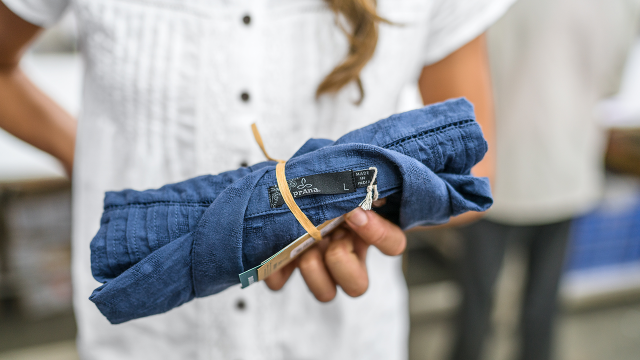In 2010, an employee at prAna’s Boulder retail store snapped a photo that depicted a room littered with mounds of polybags. The capture—and the astonishing amount of plastic—represented the aftermath of unboxing a single day’s shipments to the shop. When the photo made its way to the brand’s headquarters, it arrived with a simple question: “What do you expect us to do with all of this plastic?”
The answer, of course, would not be as simple as the request. But that was no deterrent for a brand that has baked sustainability into its operations from the very beginning. Rachel Lincoln, who is now prAna’s sustainability director, worked in its product department at the time. She understood the issue—and recognized the opportunity. “I love to tackle problems that just seem so giant and so big, because no problem is impossible,” said Lincoln. “It’s just about taking it down to its smallest component and starting there. If you build it bit by bit, eventually you’ll fix the problem.”
And that’s exactly what prAna did. The brand called all hands on deck, from the product team to the marketing department to representatives from its distribution center. The idea was to buck corporate tradition and instead of, say, tapping only packaging or sustainability experts, instead seek the collaborative wisdom, experience, and passion of all corners of its team. From this creative think tank, an equally unconventional idea emerged—why not eliminate the need for polybags altogether?
It was a bold concept. Garment manufacturing status quo dictates that bags are required for protection; a brand simply can’t risk consumer dissatisfaction, not to mention potential losses that could result by sending out dirty or damaged products. But the in-house working group lit upon a possible solution in roll-packing, where garments are tightly rolled and bound with a length of recyclable raffia, then packed into shipment boxes with a single, reusable poly lining.
Lincoln says that starting small, then scaling up, was key; prAna began testing its roll-packing process on a single garment before eventually expanding wide. The brand tapped in-house product experts to carefully consider each item and develop a decision tree with branches for characteristics like color and materials that would guide handling of each item. The team also created specific roll-packing methods for each item to ensure its integrity throughout the manufacturing and distribution process. And they tested their creations by shipping a dizzying number of packages between the factory, their distribution center, and headquarters.
While the garments themselves passed with polybag-free flying colors, the roll-packing initiative’s overall success would require buy-in at all levels of the supply chain. Luckily, prAna worked with a factory that was willing to be not only patient, but also exceptionally supportive as they retooled their process to ensure that products wouldn’t be damaged along the way. To achieve this, the working group consulted directly with the factory and distribution center to learn exactly how items were handled during each phase of the manufacturing process, so they could design an instructional video, training manual, and in-person trainings that would allow for a smooth flow. “When we go to onboard a new vendor, this is part of our training, just as we train them with our code of conduct, or our restricted substance list, or how to submit prototypes,” said Lincoln. “This is just part of doing business with prAna at this point.”
A Bigger Goal—and a Larger Movement
Roll-packing has now been part of prAna’s operations for almost a decade. Lincoln says that the brand hasn’t seen returns for dirty products, nor have they witnessed a spike in damaged ones. And as for a time-cost analysis, roll-packing doesn’t take more of the former or require more of the latter. As for the larger impact, the numbers tell the story. In 2011, after prAna launched the initiative, nearly a third of their products were shipped without polybags; by 2018, that increased to 80 percent. Lincoln says it’s the equivalent of removing roughly 3.6 million polybags from circulation.

Lincoln is proud of the brand’s work on packaging sustainability, which directly inspired REI to begin roll-packing their own Co-op branded products last year, but she’s also excited by prAna’s commitment to close the gap on that final 20 percent. While prAna does recycle the remaining polybags at its distribution center and at their stores, they’ve continued to work on solutions for eliminating them altogether, going back to what Lincoln says are the core principles of pursuing sustainability for its own good, following employees’ passions for finding solutions, and moving one small step at a time.
Tasked with continually dreaming bigger and aiming higher, the team at prAna have spent several years researching polybag alternatives and have since formed an unofficial coalition of sorts with other brands who are interested in the same; at this time, Lincoln is unable to name the others who are involved. In part thanks to the group’s sharing of both resources and inspiration, the company hopes to roll out Forest Stewardship Council-certified paper bags by the end of the year, fully achieving their goal of using only plastic-free packaging. And that same spirit of collaboration, not competition, with others in the industry has led to additional sustainability measures, like prAna converting to use only 100 percent organic cotton after another brand reached out to recommend a vendor.
Lincoln says that this spirit of working together, both in-house and across the industry as a whole, is going to continue the drive toward creative solutions across all areas of sustainability. Just as they’ve done with REI and other collaborators, prAna is willing to continue sharing what they’ve learned about developing a polybag-free roll-packing system in hopes that it will help other brands phase out plastics in their own packaging, or possibly inspire them to dream even bigger.
“I read a quote once that said something along the lines of, ‘We don’t need five people doing everything perfectly; we need a million people doing it imperfectly,’ and that’s kind of what polybags are,” she said. “We’re not going to get rid of the problem by one brand doing it, by one factory doing it; it’s got to be industry-wide. It’s got to be systematic change, where we’re all working toward the better good. And we can.”
The Plastic Impact Alliance Tackles Polybags
Transitioning from polybags to non-plastic packaging like roll-packing or paper is not a switch that companies can simply flip. Switching to non-plastic packaging alternatives is the end goal for eco-conscious brands, but in the meantime, retailers all around the country are being inundated with polybags that they cannot properly recycle. The Plastic Impact Alliance is seeking brand partners who want to help retailers recycle the polybags that flood their stores, so they don’t end up in the landfill or the oceans. If your brand is interested in learning more, please email plasticimpactalliance@gmail.com.


